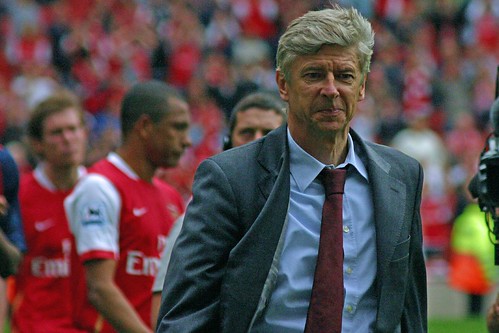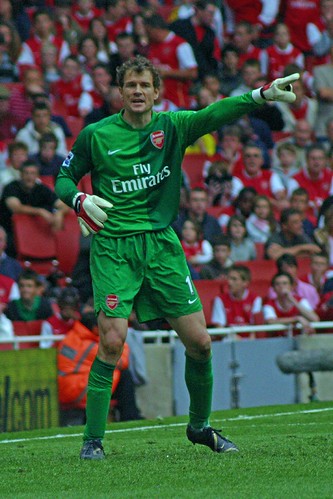Who would have thought, after Patrick Vieira stroked home the winning penalty against Manchester United in 2005's FA Cup Final, that just weeks later he'd be gone but also in six years time it would still be the last kick to win the club a trophy?
Cesc Fabregas, who would ultimately replace Vieira as the club captain, apparently (he claims it's a mistranslation) claimed that if Arsene Wenger was a manager in Spain he would have been dismissed by now after such a dry spell.
Given the success Wenger had in his first 10 years in North London, for it to stop so suddenly is quite alarming, for it to continue like that is even more alarming. It's difficult to argue with Fabregas' logic, assuming he did say it. Look at the way Barcelona let Frank Rijkaard go after a couple of poor seasons and Real Madrid sack managers like it's going out of fashion.
Even in England, you could probably say the same. Wenger is the second longest serving manager in the Premier League, behind Sir Alex Ferguson. There is a culture of reckless sackings in the Premier League, which even Jose Mourinho fell foul of.
 In Wenger's defence, much has changed for the better at Arsenal since the Frenchman arrived. They play some of the most attractive football around, they play in a huge new stadium, he's won plenty of trophies, there was the "invincibles" season and the policy of youth development.
In Wenger's defence, much has changed for the better at Arsenal since the Frenchman arrived. They play some of the most attractive football around, they play in a huge new stadium, he's won plenty of trophies, there was the "invincibles" season and the policy of youth development.The Invincibles who went for a whole Premier League season without losing should be the first thing everybody remembers about Wenger's Arsenal legacy, but he is now in danger of being remembered as being a manager who turned Arsenal from a winning team into a team that develops good players but doesn't win anything.
And herein lies the problem, it has been suggested that Arsene Wenger wants to create an Arsenal youth policy much like Barcelona. Johann Cruyff had the vision to change the philosophy of football at Barcelona. His period as manager was greatly successful and his legacy has lived on as one of his former players, Pep Guardiola has adopted that same "Tiki Taka" style.
Cruyff signed several big name players for Barcelona in his time there, the likes of Hristo Stoichkov, Romario, Gheoghe Hagi and Michael Laudrup. They benefited the sytem, and when he has needed to, Guardiola has also spent big on his team to compliment it. Buying players like David Villa, Zlatan Ibrahimovic and Dmytro Chygrynskiy.

Cruyff laid the foundations at Barcelona for Guardiola to build something truly special and Wenger will surely have been inspired by this. Wenger's youth policy has been going on for some years now. The Invincibles squad was built on a mixture of experience (Bergkamp, Pires), smart signings (Campbell, Toure, Ljungberg) and youth (Fabregas, Clichy, Senderos). It was an ideal set of elements that made a formidable compound.
Many changes have been made since then, and it has been a downhill slide for the Gunners. The current side lacks experience, and with Wenger's keenness to blood these young players and build them into a great team, a reluctance to tamper with it has appeared.
Weaknesses in the team have also appeared, and because of Wenger's aversion to change these weaknesses are there for all to see. A staggering 54% of Arsenal's goals conceded this season have come from set pieces. It's evident that opponents are capitalising on this. Arsenal do not have a truly dominant central defender in the mould of a Tony Adams or Sol Campbell. Djourou and Koscielny are fine players with the ball at their feet but they struggle with the physical side of the game.
 Myriad goalkeeping errors have been a problem ever since David Seaman left the club. A string of goalkeepers have attempted to plug the gap left by the (formerly) ponytailed Yorkshireman. The eccentric German, Jens Lehmann probably did the best job of it, but he could hardly be labelled reliable. Neither could Manuel Almunia, Lukasz Fabianski or Wojciech Szczesny.
Myriad goalkeeping errors have been a problem ever since David Seaman left the club. A string of goalkeepers have attempted to plug the gap left by the (formerly) ponytailed Yorkshireman. The eccentric German, Jens Lehmann probably did the best job of it, but he could hardly be labelled reliable. Neither could Manuel Almunia, Lukasz Fabianski or Wojciech Szczesny.This stubbornness against addressing Arsenal's problems is hurting the team. Wenger seems to refuse to admit he is ever wrong, and until he changes that stance then Arsenal will still struggle. The issue now has become does the manager change his ways or do Arsenal change their manager?
Wenger's vision for the future of Arsenal is great, in theory, and to an extent it is working. He said himself:
We will continue to have an absolute commitment to youth. We will add to that what is needed. I believe you cannot be responsible, be a big club and have no desire to develop young players.In investing so much time in the future, Wenger seems to have forgotten about the present. It's all well and good building a better Arsenal for the future, but for a successful future Arsenal, there needs to be a successful current Arsenal. Until that happens, Wenger faces tarnishing his legacy.
I feel there is always a need to improve the team but if you look at our season you cannot come to the conclusion we need a massive change.
No comments:
Post a Comment